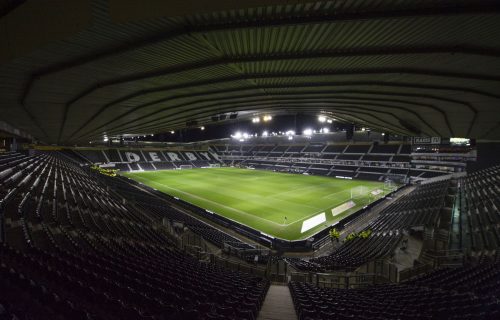Derby County deny stadium was over-valued before sale

Derby County say they will “strongly contest” any charges brought against them in relation by the EFL over accusations that they have broken financial laws.
The Rams have responded to charges with posting losses in excess of what the Football League’s governing body will allow.
The move comes after a review of the sale of Derby County’s stadium to the Club’s owner, Mel Morris.
The ground was sold to a new company called Gellaw Newco 2020 for £81.m on 28 June, two days before the 30 June year-end for the club’s 2017-18 accounts, according to The Guardian.
This meant that the Rams have their best-ever Championship turnover.
For the year running from 1 July 2017 to 30 June 2018 show turnover of £29.6m, and increase of £600,000 compared to the previous year.
The accounts show a profit of £14.6m, in comparison to a loss of £7.9m in the previous year – and a loss of £14.7m the year before – largely due to the profit on the sale and lease back of Pride Park Stadium and profit on player registrations.
Without the sale of the stadium, total losses for the three years could have been £48m, which contravenes the EFL’s rules that cannot make more than a £39m loss over a three-year period if they are covered by an owner.
The Rams will now have to face an independent committee which will decide whether any action is needed.
Resonding to the charges, Derby County issued a statement saying: “Derby County Football Club acknowledges receipt of an EFL notice of charges in respect of the Club’s valuation associated with the sale of Pride Park stadium in June 2018, and further in respect of the Club’s amortisation policy associated with intangible fixed assets (players).
“The club will strongly contest the challenge to the valuation of Pride Park stadium, as well as the newly notified charge in respect of intangible fixed asset amortisation.
“As a matter of law, the EFL is not entitled to bring either of the charges, having previously agreed to all of the arrangements surrounding the stadium sale and never having raised the issue of player amortisation before. The Club shall argue that the very bringing of the Charges itself is unlawful.
“At all times, the Club has acted transparently with the EFL in its submissions for both FFP/P&S and, in respect of the charges above, had received written approval for all of its submissions in respect of this legislation. No allegation has been raised to the contrary by the EFL. Rather, the EFL now claims that it made a ‘mistake.’
“The Stadium was valued by professional valuers immediately prior to the transaction. The transaction and valuation were discussed extensively with the EFL Executive, which asked for a relatively modest price adjustment which was accepted. The valuation report was prepared by a highly reputable and professional and independent firm, with industry experience, who had valued the stadium on two prior occasions, one in 2007, and one in 2013.
“The Club discussed the rationale for the stadium sale with the EFL Executive, ahead of the transaction, supplied and discussed the valuation, and bar a small adjustment in respect of its FFP/P&S submissions, the Club was given written approval.
“With regard to the Club’s player amortisation policy, this has been a long-term accounting policy and was again reported transparently to the EFL Executive as part of the Club’s submissions and these were again approved and signed off in writing.
“While the Club accepts the EFL’s FFP/P&S regulations are complex and open to interpretation, it is critical when such matters have been discussed and reviewed in detail, that written approval from the EFL is the only basis on which a Club can be assured it has complied. These charges by the EFL Executive bring this fundamental aspect of governance into question. The EFL now claims it made a mistake and seeks to punish the Club that relied on the EFL’s approval. Such conduct is neither lawful nor fair.
“Had the EFL not given the green light in writing in respect of both charges, the Club would have reacted accordingly. The Club cannot re-trace the steps of the actions it legitimately took in good faith as a result of EFL approval of both matters.
“The EFL can choose to correct what they now see as an error in their decisions. However, it cannot punish the Club for its own errors. The Club shall therefore vigorously contest the charges and the EFL’s legal right to bring them. The Club and all staff will be making no further comment on these matters.”









